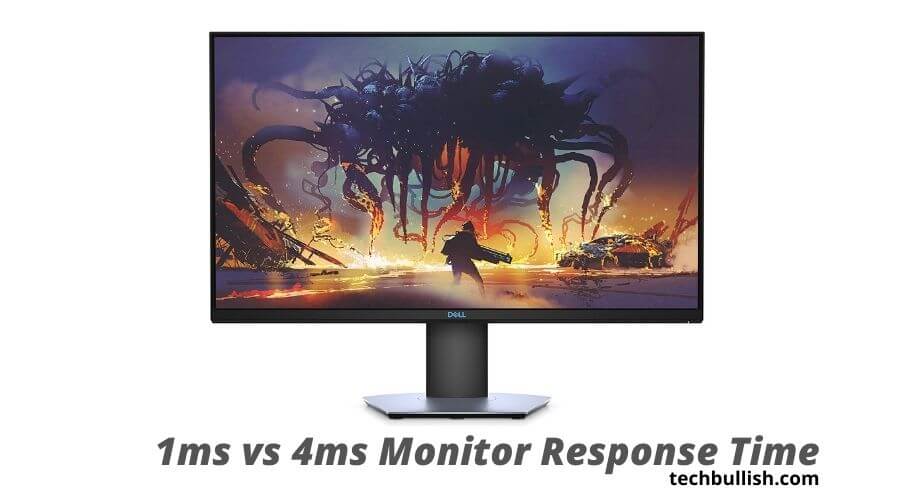Monitor response time is one of the most important things to consider when purchasing a new monitor.
If you are looking to compare the 1ms vs 4ms response time of the monitor, then this is the right post.
To have a good gaming experience, you need a monitor to react to what is happening on the screen.
For example, if you’re playing a game that requires quick reflexes, you want your monitor to register the motion as fast as possible.
Another reason the monitor’s response time is important is that it plays a crucial role in your everyday computing experience.
In this article, I would compare and cover the differences so that you would know if the differences between 1ms and 4ms are noticeable at all.
Let’s get started!

What is Monitor Response time?
Response time is how long it takes for a pixel to change colors from one to another.
For example, if your monitor is rated at 4ms response time, it will take 4ms for a pixel to change visibly from one color to another.
This is a scientific measurement of how fast your monitor reacts to information on the screen.
A higher response time means that the monitor will be affected by any lag caused by graphics chips.
A lower response time is vital for keeping a smooth flow of graphics on your screen.
So make sure that your monitor has a response time below 10ms!
Is 1ms vs 4ms noticeable?
There’s a difference between 4ms and 1ms. At the same time, 4ms seems to be the more popular option; opting for 1ms means that you’ll get the advantage of smoother gaming performance.
This is particularly the case if you’re playing competitively, such as in a multiplayer first-person shooter.
So, Is there a big difference between 1ms and 4ms? A 1ms response time is 1/1000th of a second and is four times faster than a 4ms response time.
Difference between 1ms and 4ms
The millisecond (“ms”) is a unit of time equal to one-thousandth of a second. I know what you’re thinking.
What’s the difference between 1ms and 4ms? Well, 1ms is one-thousandth of a second.
4ms is four-thousandths of a second. Just for comparison, imagine one hour is 3600 seconds (an hour) and one second is 3600ms (one second).
As you can see, they’re both very small amounts of time. You might not even notice the difference between a 1ms space and a 1ms space.
1ms vs 4ms: Which is better?
The 1ms and 4ms argument is just that, an argument. There is no better option between these two speeds; each has its unique benefits and drawbacks.
The average human eye cannot see the difference between the two, nor is the human brain capable of understanding the difference.
Because of this, it is up to the manufacturers to decide which option is best for their product.
While no one offers a 1ms monitor, some companies offer a 4ms monitor because it is cheaper to manufacture.
The noticeable difference of 2ms is not worth the price difference, but it is still an option for manufacturers.
Related: 1ms vs 5ms
1ms vs 4ms FAQs
Q. Is 4ms vs 1ms noticeable?
Q. What is 4ms response time in Hz?
Q. Is 4ms good for CSGO?
Conclusion
Let’s conclude the post.
I wanted to help my readers with a very technical and specific question about whether they should buy a monitor with a 1ms response or a 4ms response time.
I know that these numbers can sound confusing and that it’s hard to know which is better for you.
That’s why I break down the comparison of 1ms vs 4ms monitor response time and explain why you should choose a monitor with a 1ms response time.
A 4ms monitor will show a new color four times faster than a 1-ms monitor.
For gamers, the lower the response time, the better. Low response times combined with low input lag are great for gaming.
I hope you enjoyed this blog post.
You May Also Like to Read:

I’m Anirban Saha, Founder & Editor of TechBullish. With a B.Tech in Electronics and Communication Engineering, and 5+ years of experience as a software developer, I have expertise in electronics, software development, gadgets, and computer peripherals. I love sharing my knowledge through informational articles, how-to guides, and troubleshooting tips for Peripherals, Smart TVs, Streaming Solutions, and more here. Check Anirban’s Crunchbase Profile here.
